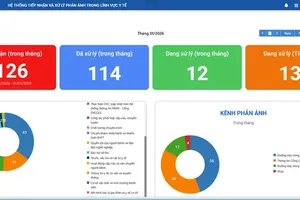
Ho Chi Minh City’s health sector is taking the lead in implementing Resolution 72-NQ/TW of the Politburo with the launch of electronic medical records and the integration of a shared data warehouse, which is key step in protecting, caring for, and improving public health.
These initiatives solidify the city's commitment to realizing the Politburo’s Resolution 72-NQ/TW, which outlines breakthrough solutions for strengthening public health protection, care, and improvement.
The Ho Chi Minh City Department of Health today convened a conference to announce the results of the electronic medical records implementation and the standardization of the city's health data warehouse. Deputy Secretary Nguyen Phuoc Loc of the Ho Chi Minh City Party Committee and Chairman of the Vietnam Fatherland Front Committee of Ho Chi Minh City attended the event.
According to Associate Professor Nguyen Anh Dung, Deputy Director of the Ho Chi Minh City Department of Health, electronic medical records are currently being used in 153 out of 164 hospitals across the city. He noted that this effort is a foundational step toward establishing the big data infrastructure, a goal the health sector is pursuing in coordination with other agencies, especially the City Digital Transformation Center.
At the conference, Chairman of the Vietnam Fatherland Front Committee of Ho Chi Minh City Nguyen Phuoc Loc praised the health sector for overcoming challenges to achieve electronic medical record deployment in more than 93 percent of hospitals and for standardizing the city’s shared health data warehouse.
He emphasized that the shared electronic medical record platform is a breakthrough solution, acting as a safety net for hospitals by synchronizing data and connecting with the citywide medical data repository. This system not only supports individual hospitals but also provides a comprehensive picture of community health, enabling more effective policy planning, forecasting of health trends, and laying the groundwork for Ho Chi Minh City to become a regional and Asian medical hub.
The Chairman of the Vietnam Fatherland Front Committee of Ho Chi Minh City affirmed that the rollout of electronic medical records and the integration of the shared data warehouse demonstrates the city health sector’s pioneering role in concretizing the Politburo's Resolution 72-NQ/TW on breakthrough solutions to improve healthcare.
He urged the sector to accelerate the rollout of electronic medical records at remaining hospitals and ensure their participation in the shared data system. At the same time, he called for a review of difficulties in implementation and for policy recommendations to ensure smooth and effective operation.
Other priorities include accurately reporting practical challenges to secure policies on staffing for hospital IT teams, covering electronic record operating costs, and addressing disparities in technology infrastructure between hospitals.
Chairman Nguyen Phuoc Loc also stressed the need to expand electronic health record coverage for the elderly across the city, moving toward inclusion of other groups such as children and women. He encouraged the application of artificial intelligence and big data analytics in disease forecasting, research, and health management, as part of efforts to develop a smart healthcare ecosystem that contributes to Ho Chi Minh City’s vision of becoming a modern, livable, and innovative city.
At the conference, directors of hospitals in Ho Chi Minh City collectively signed an agreement to effectively develop and utilize the city's healthcare big data repository. This serves as an asset for the healthcare sector, contributing to the shared data pool and supporting the economic and social development of the city.
























